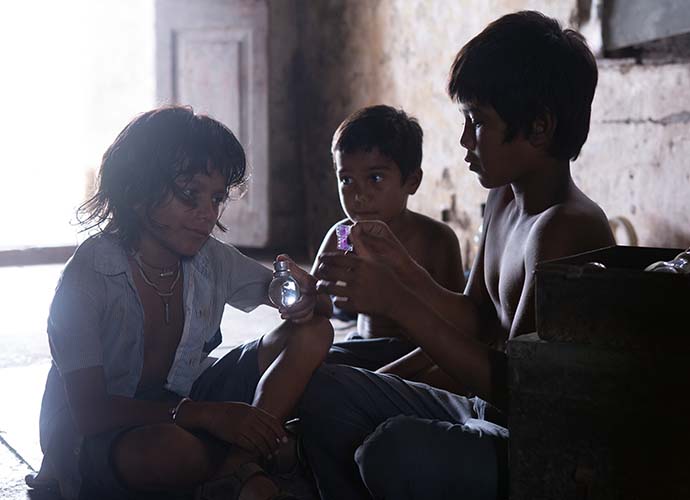‘Last Film Show’ Movie Review: A Cliched But Endearing Love Letter To Cinema & Childhood

3/5
At some point in our lives, whether as small children or as budding young adults, we all have that one movie that not just inspires us, but truly showcases to us the wonder and magic of film. Whether it’s a massive blockbuster or a small indie film, whether it be in front of the biggest screen in the theater or in the comfort of someone’s own home, there will always be that moment when a movie just “gets” someone. There will always be a movie or movies that speak to someone internally, and while not everyone will be inspired to make films of their own, they will always undergo some sort of internal transformation because of their experience with film, and I don’t think anyone understands that better than the lead protagonist of the film, Last Film Show.
Last Film Show is a 2021 Indian Gujarati-language coming-of-age drama film directed by Pan Nalin. It stars Bhavin Rabari, Bhavesh Shrimali, Richa Meena, Dipen Raval and Paresh Mehta, and it follows the character of Samay (Rabari), a nine-year-old boy from a rural village in India who spends his entire time watching films from the projection booth of a rundown theatre. In his cinematic misadventures, he becomes friends with the projectionist, Fazal (Shrimali), and together they relish in the wonders of food and film.
Despite his parent’s wishes, Samay is so enamored with film and filmmaking that he eventually becomes inspired to become a filmmaker himself, and I think this aspect of the film’s plot and how it intertwines with the main character of Samay are the defining aspects of Last Film Show: how the magic of cinema can inspire one to create their own art. Granted, this premise is not anything new as we’ve seen it explored in countless other movies, the most famous of which is Cinema Paradiso. Thankfully, the film does enough to help separate it from Cinema Paradiso, the most obvious of which having the film take place in rural India and Bollywood being the driving inspiration for the young Samay.
Granted, my knowledge about Bollywood and Indian cinema as a whole is very limited, but thankfully the movie does not require that I know much, if anything, about this culture of film as the entire narrative, is told from Samay’s perspective. Like us, Samay is very inexperienced with film as his parents forbid him from seeing movies aside from the occasional religious film, which the family goes to see in the first 10 minutes.
However, Samay is so inspired by that family-going theatre experience that he begins sneaking into the theatre and starts watching more and more movies, eventually to the point that he wants to make movies himself. Seeing this character grow and watching Samay become more and more confident about his passion for filmmaking is without a doubt the best aspect of the movie. Through a montage of several types of films, from action movies to musicals to romantic dramas, we see that Samay watches everything he can get his eyes on.
He punches the air the same way the action hero does. He waves his arm as if he is wielding a sword as a swashbuckler did in one of the films he saw. He even uses his inspiration to drive the movies he makes, as seen as early in the halfway point when Samay makes a cardboard cut-out and uses it as if it was a camera recording a scene. It’s incredibly inspiring watching Samay do all these things, reminding us of the child-like wonder and imagination we once had about cinema.
The film is not perfect though as there are some major issues that litter the film. For starters, the movie is insanely repetitive as much of the movie is simply the same set of scenes over and over again: Samay leaves his home with his lunch box, sneaks into the theatre, watches the movies, recreates scenes from the movies when playing with his friends, etc. Rinse and repeat, it’s the same thing over and over again, and while thankfully the film changes things up a bit near the second half, having such repetitiveness still felt incredibly draining.
Additionally, and this is a personal preference more than anything, I wish that Last Film Show had something deeper and more unique to say about its subject matter other than “movies are awesome and magical and inspire kids to be creative.” While I enjoyed its execution in this film, I still couldn’t shake the feeling of how derivative it is of other movies like this. There were very similar elements between this and Cinema Paradiso, and I just needed more to help it stand out besides its setting.
However, beyond my issues with this film, this is still a very enjoyable and entertaining movie that I highly recommend. While it might not be a perfect masterpiece, there is still a lot to get out of this, whether you’re a casual fan of the theatre-going experience or a struggling artist dreaming of becoming the next great director.
RELATED ARTICLES
Get the most-revealing celebrity conversations with the uInterview podcast!








Leave a comment